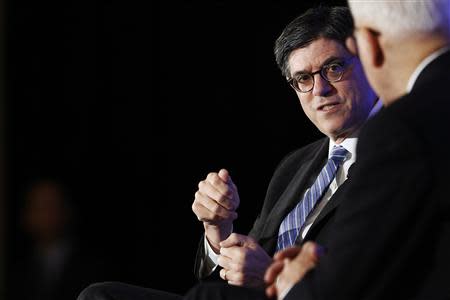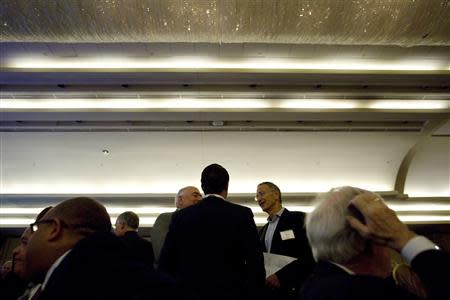Treasury urges Congress to act now on U.S. debt ceiling
By Jason Lange WASHINGTON (Reuters) - Treasury Secretary Jack Lew on Tuesday warned Congress against waiting until the last minute to raise the nation's limit on borrowing, saying a misstep could irrevocably damage the economy. "We cannot afford for Congress to gamble with the full faith and credit of the United States," Lew told the Economic Club of Washington, a business forum. The government has been scraping up against its $16.7 trillion debt limit since May but has avoided defaulting on any bills by employing emergency measures to manage its cash, such as suspending investments in pension funds for federal workers. Lew repeated a warning he made last month that Treasury would run out of borrowing options around mid-October, when he said that Treasury would be left with only around $50 billion in cash on hand. Default could come soon after that. As America runs lows on cash there is a risk investors could lose confidence in Washington and stop reinvesting in U.S. government debt. Every Thursday, the Treasury pays investors back about $100 billion that investors immediately lend back to the government, a process known as rolling over the debt. "If U.S. bond holders decided that they wanted to be repaid rather than continuing to roll over their investments, we could unexpectedly dissipate our entire cash balance," Lew said. Any default on the nation's debts could be calamitous for the U.S. economy. A default would rock Wall Street and hurt businesses and families by fueling a sharp increase in interest rates. Washington tempted disaster during a heated debate over the debt ceiling in 2011. The debate roiled financial markets and helped prompt credit ratings agency Standard & Poor's to strip America of its prized top-tier rating. The White House has vowed not to negotiate over the debt ceiling, but Republicans this year are nevertheless trying to use the need to raise the debt limit as leverage for their goal to reduce the size of government. Republicans in the House of Representatives last week considered a plan to tie raising the debt ceiling to withholding funds for President Barack Obama's signature healthcare overhaul, but put off a vote because the party's most fiscally conservative members felt the plan lacked teeth. Taking aim at the divisions among Republicans, Lew said it was pointless for a minority in one house of Congress to think it can call the shots in the debate. "The reality is that's not going to happen, and the sooner they understand that the better," he said. Even if the government retains the bond market's trust through mid-October, Lew said it would be dangerous for Congress to wait until then to raise the debt limit. That's because it is impossible to know for certain how much money will enter and leave public coffers on any given day. The government could begin defaulting on its obligations between the end of October and the middle of November if the debt ceiling is not raised, Congressional Budget Office director Doug Elmendorf said on Tuesday. If that were to happen, Lew said it would not be possible to prioritize payments among the many people to whom America owes money, from retirees drawing government pensions to bond holders. "I am anxious," Lew said, although he said at least it appeared that no congressional leaders appeared to think default was a reasonable course of action. (Reporting by Jason Lange; Editing by Theodore d'Afflisio, Krista Hughes and Leslie Adler)






